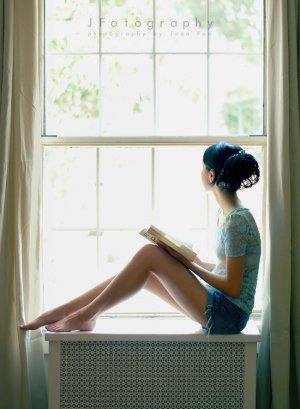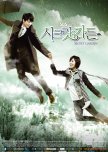
When I started Secret Garden, I really didn't read the description. And, maybe that's a good thing. I might not have given it a fair shot. Because of that, the twists and turns that I experienced (especially after episode 5 or so) had such a big impact. My train of thought when things started to get interesting: "Wait, did they...did that really...did she just grab her own boobs? Wait a minute, did they just switch bodies? What? WTF? What just happened here?!" In all honesty, I should start watching everything now without reading descriptions. So much more emotional build-up and surprise. But, anyway, I digress.
With very few exceptions, Secret Garden did everything right. An unexpected plot journey, a phenomenal cast (even down to the supporting actors - Lee Jong Suk isn't just brilliant as a main lead in dramas...), beautiful settings, an evocative and unique soundtrack, heaps of awkward comedy, tear-jerking drama, and more. It was (and still is) everything I could ask for in a show.
Hyun Bin and Ha Ji Won are simply incredible. Their chemistry is immediate, and it becomes an excellent foundation for the remainder of the story. Honestly, though, while I have a certifiable girl crush on Ha Ji Won, Hyun Bin truly made this drama. Completely. From the comedy of the body switching to the drama of the later episodes, he NAILS IT. The growth and changes that his character experiences are so fun to watch.
If you are unfamiliar with kdramas and would like to start, give Secret Garden a try. It's a great example of when things are done right. Even if you are a kdrama veteran and still have not managed to see it, I would still recommend it. There's a reason why so many dramas include bits from it.
Cet avis était-il utile?
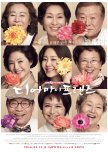
Story:
This was a story of love, its inherent sacrifice, and a story of forgiveness. It was a story of friendship through the ages and family. I couldn’t watch it without relating to the story in some way. It was impossible.
Every character was written in a way that engaged my understanding and sympathy but tested me in all the right ways, as real people always do. For example, Kim Suk Kyoon, a crusty and cantankerous security guard that often took his wife for granted, was a product of a generation with bread-winning men that made all the important decisions and women who did most everything else. Would it be right for him to take all the blame for everything he did if he was raised a certain way? He tested me (a lot) and my modern views on women, but his character evolved with the story as it should. Just like every single one of the others, he made mistakes, he regretted, and he emerged at the end, embracing the truths of his life in a realistic way. Unlike some dramas, the characters in Dear My Friends didn't lose their personalities by the end of their journeys. They all had the same frustrating, lovable quirks that made them unique while they simultaneously accepted their true selves. That's good writing.
Dear My Friends handled tough subjects with a perfect combination of pragmatism and empathy while also blending in humor and heart. I very (very) rarely enjoy korean drama humor, but this was an exception. The writer wove in the usual drama tropes but simultaneously brought in atypical characters and situations to freshen them up or poke fun at them. For those of you curious about romance, there were several couples written into the story, young and old, and each of them had their own set of issues that fed into the main themes of the story.
The only gripe I had (if it could even be called that) was the lack of flashbacks, and I am still shocked that I felt that way. I HATE flashbacks because of how often they slow the pace of a story, but I wanted to get a better grasp of who the characters were before. It didn’t have to be every episode - just a little more for perspective and all that. But, to be honest, this is personal preference. The story didn’t HAVE to have them.
Acting/Cast:
Absolutely no complaints. These actors embodied their roles to the point that they imprinted themselves on my heart, flaws and all. I will forever remember their roles as if the characters were real people that I met at my local convenience store (in my dreams, where I live in South Korea, of course). That's the beauty of slice-of-life stories.
There wasn’t a standout performance, and I mean that in the best sense. Each actor supported the rest of the cast, and the audience got to reap the benefits of experiencing seasoned actors. I love a good newbie actor that wows me with unexpected talent, but sometimes I want to trust that I'm in good hands. And I was.
Music:
I will remember the intro music the most, and I might recall one or two songs from the drama. The OST won’t be something that I’ll obsessively listen to for months to come, though. Perhaps one day I will look back on the drama and get nostalgia goosebumps when I hear the theme song again, but it won’t be more than that.
Rewatch Value:
This is a good example of a lower rewatch value that proves the strength of the drama, rather than any weakness. I don’t need to obsessively rewatch this. Once again in a few years may do the trick, but the heartwarming rawness of the story will stay imprinted on my brain for a long time.
Cet avis était-il utile?
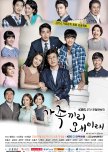
What Happens to My Family?
9 personnes ont trouvé cette critique utile
Story
We all get distracted with school, work, romance, dramas...it's so easy to do. We lose sight of the good things life gives us in favor of the stresses, and WHTMF captured the story of a broken family too preoccupied with those stresses to realize how broken they are. Kang Shim and Kang Jae dedicated their lives to their careers and Dal Bong searched in vain for acceptance yet wasn't willing to put in the effort to focus. Soon Bong believed coddling his children in their selfish desires was better than confronting them about their mistakes and neglect. Sul Hee was more concerned with media image than giving her son what he needed, not to mention the supporting cast and their own list of troubles. They all pushed aside the idea of family in one way or another, some much more stubbornly than others.
The only reason I wasn't able to give this section full marks is because there was a significant focus on comedy, and I have a hard time enjoying korean comedies these days. Other than that, I enjoyed every bit of seeing the characters evolve. The writer blended in the shorter side stories with the overarching plot well, and it all revolved around one message: Life is unpredictable, and we must take each moment to appreciate each other and what we’ve been given. WHTMF had quite a few heavy moments, but it balanced them with comedy and a focus on the positive.
Acting/Cast
The standout in this drama was the cast. The story only struck home the way it did because of the acting. Park Hyung Sik especially proved himself as a versatile actor with the delicate emotional scenes as well as that signature Korean comedy. The seasoned actors also had strong performances, especially Yoo Dong Geun. I will have a hard time seeing him as anyone besides the genuine, bespectacled Cha Soon Bong that danced to the radio in his tofu shop each day.
Some of the characters in the drama will test you, and it was surprising how vicious they got. One character especially was so heartless that I swore during the drama that I would never forgive the things they did. How could they be so mean?! But the weight of regret they carried when the day of reckoning eventually came was enough for me by the end, and I embraced the cast as a whole. It was a journey, sometimes arduous and frustrating, but worth it. I encourage you to watch this if you are in the mood for a heartwarming story about an imperfect family needing a push in the right direction to find togetherness and healing.
Music
It isn’t very often that you hear a drama ost from an aged voice such as Choi Baek Ho, and I loved it! I also loved Yozoh’s lighter counterbalance. The choices the music director made were perfect for the drama plot and characters equally, and they heightened my emotions at the right times.
Rewatch Value
Parts of this are very rewatchable, though I don’t know if I would commit to rewatching the entire thing any time soon. It was light, but it was also extremely heavy.
Cet avis était-il utile?

Story:
I put off watching Battle of Changsha for months because I was convinced that it would be full of fighting scenes, and those are not my cup of tea. it was only after a few trusted MDL friends started telling me about it that I gave it a second look. The heart of Battle of Changsha is not in the overarching plot of the war but how that war plot molds and changes a family living in Changsha. Every skeleton in the closet and character flaw, no matter how deep you bury them, come out in times of war, and Battle of Changsha monopolized on that concept. It takes a group of characters with flaws and misconceptions about themselves (and, in some cases, each other) and allows them to grow and bond. The best and worst of their characters will come out as the drama unfolds. It was fascinating to watch, because the story was more concerned about being truthful and honest than giving the viewer rose-colored shades.
The cinematography was some of the best I've ever seen in a drama. It wasn't just about capturing facial expressions or that one kiss scene and using the same four camera angles like in some dramas. It added another dimension to the emotion of the scene, making me feel as if I was with the character(s) in that moment. Battle of Changsha actually had scenery worth seeing, and the production crew took full advantage of it.
There ARE sad moments in this drama, as I’m sure you can tell by the comment section here. I won’t lie to you and say that there weren’t any. However, the story doesn’t drag the viewers through constant drama and grief for 32 episodes. There’s also mischief and laughter. Loud family dinners. Romance. Lazy afternoons listening to Chinese opera.
Acting/Cast:
Even though I rated both story and cast a well-deserved 10/10, I believe that the casting is where Battle of Changsha truly shines. In such a character-focused story, the casting makes or breaks the drama. Battle of Changsha did not disappoint. You won’t find tons of overacting here like in so many other dramas. Every cast member brought their all to the table, and it shows. Their emotion is subtle enough to be realistic, and that type of delivery makes it SO much more powerful.
I could go on and on about so many of the characters, but I will highlight just one in particular that struck me. If you've seen Battle of Changsha, you can probably guess which one. He's impossible to miss, both in stature and in character. Xue Jun Shan will forever remain as one of my favorite characters of all time. At first, the plot capitalizes on his surface character - an enterprising amy security officer that’s unable to say no to a good opportunity, regardless of how ethical it is - but he's so much deeper than that. His journey and growth over the course of the drama were everything. I don't want to give more away and spoil your experience, so I will leave it at that.
Music:
The music was appropriate and powerful in its subtlety. In the beginning, the melody is innocent and reminiscent of youth. It slowly develops in complexity as the plot thickens and characters change. I especially liked how the power ballads (the ones that are in every drama without fail) didn't play ad nauseam. It would have cheapened the experience.
Rewatch Value:
I just completed my second watch of the drama. I don't feel the need to rewatch this as often as some of my other drama favorites, but the emotional scenes still captured me. Plus, I noticed details I missed the first time, and they gave me an even higher respect for the production crew. The only complaint that I have isn’t with the drama itself but at the lacking subtitle quality. The only set of subs I found had several scenes in every episode that weren’t even subbed and the translations had very poor grammar.
Cet avis était-il utile?
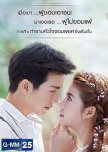
U-Prince The Series: The Handsome Cowboy
9 personnes ont trouvé cette critique utile
TL/DR? This might be better received among watchers that frequent lakorns with slap/kiss themes. For those of you that are unfamiliar with and/or disinterested in that concept, The Handsome Cowboy isn't for you. Trust me.
Story:
The broken story was my biggest issue with the drama. I realize that with an eight-episode romcom my expectations shouldn't be THAT high to begin with, but still...It didn't deliver.
To me, the success or failure of a story is determined by the writer convincing the audience that, despite a character's flaws, he or she is still worth rooting for. To me, Sibtit isn't. Not by a long shot. The drama writer created Sibtit as an extremely realistic bad boy. At first, I loved that. Realistic and flawed characters that aren't plucked right out of fantasyland? Heck yeah. Sibtit pushed buttons just as he should have, and I loved the first few episodes.
But as I got further into the drama, he continued to push them, even after a series of giant mistakes, where I expected him to head down the path of redemption. And it didn't stop. They egged his character on to the point where he became unforgivable, and there wasn't NEARLY enough time to redeem him. Does that kind of stuff work in full-length dramas? Sure! In eight-episode romcoms? NO. What am I supposed to take away from the story? That dating violence is okay because the OTP got their (undeserved, imo) happily ever after? I was supposed to be laughing and fangirl swooning, but it just made me sick.
On top of all of that (as if that wasn't enough), there's Prikkang. Her blinding faith in Sibtit - how she was so often a victim to his force or neglect and STILL forgave him - it was sickening to me. I understand the appeal of her character in a general sense. I get it. But this was too much when paired with Sibtit. She got the guy in the end, but at what cost? Was it worth it? Is relationship happiness more important than your value as a person? Was your sacrifice really that noble?
UGH. I just...can't anymore with this.
Acting/Cast:
Despite all of his character's faults and the drama's poor execution, I can't rob Push the respect of playing a realistic character well. He brought out every single emotion he should have in such a role. I hated him, and I still struggle with seeing him outside of Sibtit. I thought Esther had a good chemistry with him, too, and she convinced me of her character's gullible and sweet demeanor, no matter what I thought of the story. The rest of the cast fell into recycled archetypes - the GBF, the heinous second female lead, the nice second male lead, etc. Nothing memorable, but nothing particularly bad, either.
Music:
The OST and score to this were unmemorable. I believe it suited the length and style of the drama fine enough, but I don't recall any of it now, and I doubt that I would recognize it if I heard it in passing.
Rewatch Value:
I won't ever rewatch this unless I'm in a hateful mood and need something to yell at (anybody else have those moods?). There's no good takeaway value in the story, and, frankly, the characters make me want to vomit.
Cet avis était-il utile?
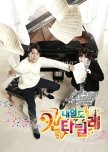
What I loved most was the setting and music plot lines. The twists weren't overly unexpected, but I really enjoyed being in that element and watching the musicians perform and grow. If you're a big fan of music, especially classical music, I would definitely suggest giving TC a try. It's not overly true to life (it's a drama after all), but being so immersed in the culture is very satisfying.
The soundtrack was really incredible. They brought in many familiar classical pieces, but they would often do variations on them to fit the mood or plot line. Plus, one of my biggest pet peeves is when an actor makes no effort to look like they're actually playing an instrument. I can tell that TC's actors/film crew worked hard to make it look legit. It definitely requires more effort, but the results were worth it.
I unfortunately had mixed feelings about the cast. I loved the stuffy and rigid Yoo Jin, who desperately seeks a career in conducting. He was a bit stiff sometimes, but I thought it worked with his character. The other cast members on the whole were a tough sell. To counterbalance Yoo Jin and some of the antagonists, most of the other students spent a lot of the time in bits of over-the-top humor and antics. Nae Il especially. It was only in the last few episodes of the drama that I truly began to like them, and I think it was because the climax of the show eliminated a lot of the ridiculous humor.
Although it's categorized as romance on MDL, I don't recommend watching TC for that. It's there, but it's not the ultimate focus and drive of the drama. There isn't anything overly creative or inspiring about it, and I didn't find myself skipping other parts urgently to get to it. Some moments were cute, but watching 20 episodes for that plot line is not a great idea. Honestly, it often made Nae Il hard to swallow because of how crazy she would get over Yoo Jin. That's just not my thing when it comes to a female lead.
Overall, I was pleased, and it might be something I'll watch again if I'm in a mood for music. I loved the setting and being so involved with the music. It hit very close to home. The actors did a great job in highlighting the positives and negatives of what it means to be a musician and the motivations behind your craft. But, if you are considering watching it, make sure you are looking for a relatively light drama with heavy doses of humor and very basic romances.
Cet avis était-il utile?
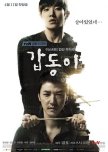
The overall story was compelling, unique, and well developed. When I thought I knew what was going on, Gap Dong knocked me flat on my face. That unpredictability is what I crave in a show, thriller or otherwise, and Gap Dong delivered.
Lee Joon was perfect as Ryu Tae Oh. He was sadistic, as any good serial killer should be, but he was more than that. There was a depth of character beyond your normal villain, and he continued to grow and develop throughout the show. I especially loved the moments when his face would take on a childlike quality. Not all that intimidating by itself, but when he adds a murderous gleam in his eyes and a big grin, it's SCARY. I'm still getting chills just thinking about it.
On the other hand, though, I maintained a lack of sympathy for all the other characters. Maybe that's harsh, but it was an intense struggle. I love smart characters that make decisions heavily based in logic and fact, especially when it comes to thrillers and mysteries (like Ha Woo Jin in Liar Game or Sherlock in BBC's Sherlock). It seemed to me that everyone was operating on half a brain. Maybe that was intentional (how is he going to kill people if they are smart enough to catch him?). I don't know. Regardless of what the writer's intentions were, I had a very rough time.
Bottom line - If you are looking for an excellent villain story with lots of twists and turns, watch Gap Dong. I will echo what many others have said: Lee Joon is outstanding. But if you despise characters who make stupid decisions and come to illogical conclusions because of their emotions or personal biases, you might struggle just like I did.
Cet avis était-il utile?
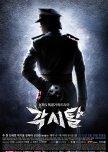
Story:
At its heart, The Bridal Mask pits conflicting concepts against each other in poignant ways. Themes such as the importance of identity, fate vs. choice, devotion to a cause vs. personal desires, and the need for revolution dominate the storyline. Each and every character suffers for what they believe; the story demands that they prove their loyalties time and time again, no matter what side they're on. There are occasional imperfections and the story sometimes becomes obvious, but my enjoyment didn't lessen.
As much as I love my romance stories, the true strength of The Bridal Mask is the star-crossed relationship between our antihero lead, Lee Kang To, and his childhood friend, Kimura Shunji. Their layers are explored with every major plot point, and their symbiotic link powers so many feels. It's about more than just two best friends. Their internal priorities matter. Their family ties and conflicting heritages matter. Their decisions matter.
There isn't a straight-up vanilla hero in this drama. At the beginning of the story, Lee Kang To voluntarily works for a government who oppresses his neighbors and family. He stops at nothing to get what he wants, even if it means torturing an innocent person (this includes women, y'all) for information. Japanese and Koreans alike demean him and (in some cases) torture him for his choices, and the chip on his shoulder feeds into the man he is. Even placing Kang To aside, the other leads have inner demons and misconceptions, some of them more apparent than others, and the show doesn't let these characters spiral into wasted opportunity. It absolutely brings them out to play to enhance the themes of the story. This is MY JAM.
Acting/Cast:
I had no expectations of the cast, having never met them before in other dramas, and I remember the moment it happened - the moment I knew it was true love. I lay in bed at nearly two in the morning, tears streaming down my face because of a side character - A SIDE CHARACTER - over his seemingly insignificant yet incredibly moving part in the story. And that's the kind of drama The Bridal Mask is.
The crew spare no expense in acting talent when it comes to the cast. Joo Won, Park Ki Woong, and Han Chae Ah especially shine in their parts, and the stress they must have endured is evident. Some of the scenes they pull off are incredibly difficult and draining. The supporting cast also provide the perfect setup and delivery for the plot and main cast.
I would rate this section a full 10/10 if one principal actor - Jin Se Yeon - fulfilled her role completely as a lead actress. She begins with fire and conviction, immediately catching my attention, but she doesn't quite reach the talent level the others have. This isn't her worst performance in a drama (by far), but the other cast carry her in a few scenes as we reach the climax of the story. Ueno Rie (played by Han Chae Ah) is, by far, the better of the two female leads, both in character complexity and acting talent. If you're looking for a lady badass, she'll be the one to watch for.
Music:
The Bridal Mask has an excellent soundtrack and score. My love for it could be blurred by nostalgia, but I enjoy its blend of eastern and western flavor, which carries through in the drama itself. It’s exactly the type of soundtrack and score that I look for in a drama, and the instrumentals especially are my favorite.
Rewatch Value:
I don't normally rate high-tension and emotional dramas "well" in the rewatch value category, if it can be called that. I think a drama can be better for having a low rewatch value if the message and takeaway value are long-lasting. The Bridal Mask is an exception for me, though. When I'm in the mood for angst and antiheroes, which is often, it's one of my first stops.
Cet avis était-il utile?
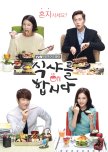
Let me tell you how wrong I was. I've never wanted to eat so much in my life. It's like I was pregnant, had PMS, and was nearly starved to death at the exact same time. My mouth was watering for the entire sixteen episodes, and my bathroom scale had a big frowny face when I finally finished. I ate enough food to feed a small village - SO embarrassing. But, it's one of the best dramas I've ever seen to satisfy a curiosity about Korean food. They take the time to talk about the ingredients, the cooking methods, the tastes, the textures, and it was all accompanied by excellent filming angles to best show the food. Some dubbed it food porn, and they were so right. From the visual feast to the noises the actors were making while eating, it's a very appropriate term.
While I don't think that the plot was the best, it suited the drama. I wasn't overwhelmed, and it added depth to each scene. It was a complement to the real focus of the drama - the food and the bonding experiences of eating with others. The characters and soundtrack helped round everything out. They were exactly what I'm beginning to expect from tvN dramas - a bit strange and quirky...yet endearing.
Let's Eat had many slice-of-life elements. I felt as if I was there, living in their apartment building and enjoying meals with them. It was so comforting and easy. There'll be romance, but it's pretty slow to progress. The characters have to bond over food for quite awhile before opening themselves up to love. It was a lot like the other plot lines - understated, but a true complement to the food.
Overall, a great drama. My re-watch value is a bit lower because plot and romance are the biggest reasons why I come back to a drama. They were simple and endearing here - just not at the binge re-watch level for me. However, when I'm in the mood for a food drama, this will now be my go-to show. If you are thinking of watching it, be prepared for a drama that will warm your heart, but make sure to lock yourself away from any food. I wish I was kidding. I'm not.
Cet avis était-il utile?
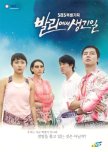
What Happened in Bali
4 personnes ont trouvé cette critique utile
This drama was an extremely emotional, elaborate, and lengthy train wreck - but in the BEST sense. You begin with characters in the midst of a somewhat complicated relationship, and each episode continually adds to a web of deceit, greed, jealousy, love, and obsession that binds the main characters together. Even though the love square was a big part of the plot, the drama really brings to light what people will or won't do to satisfy their greed and how that can affect their lives. I didn't love any one main character over another, and I think that that was intentional - they all made their share of poor choices. I really have to hand it to the actors of these characters. Well done.
WHIB was not without frustrations, though. A lot of the meaty parts of the plot center around corporate business. Jo In Sung, So Ji Sub, and several supporting characters all work (and scheme) there, and it becomes an easy vehicle for them to try to get revenge on each other. Some may find this interesting to watch. I don't. It got old quickly and made some of the later episodes a bit draggy.
I found the supporting cast to be a bitter but necessary thing. The main characters didn't just make their decisions for themselves - there often was a supporting cast member behind it all, which made me hate them a little (or a lot) for what they put the main characters through. I can't deny their importance, though.
I will not re-watch it fully (I may skim a bit to see the actors again), but I really don't need to. The message of the drama was powerful enough for me to be perfectly fine with one complete watch.
If you're looking for a drama that's heavy on darker themes, this would be a good one to start. The love square of the main characters and the corporate business are the biggest plot lines, but the real force of the drama is the greedy and selfish sides of being human.
Cet avis était-il utile?

My Father is Strange
1 personnes ont trouvé cette critique utile
Story:
Byun Han Soo was a quiet man who contentedly ran Daddy's Snack Shop to support his wife and four adult children. The children bickered with each other often over sharing clothes or who had to pay when buying their parents presents, but they looked out for each other. Na Yeong Sil happily mothered them all while trying to keep her own mother and naive brother in check. They appeared to be content enough, but it all got thrown out the window with the arrival of a lonely and guarded yet eager idol actor, Ahn Jung Hee, and his turtle, Al. And the best thing about MFIS was that, while there was one big misunderstanding that eventually resolved toward the end, every decision these characters made felt realistic to their personality. The drama had the time to let them be honest. They were so fleshed out that their decisions and logic made actual sense (it's sad how often this doesn't happen). It wasn't like watching a shorter drama where they cram in unnecessary misunderstandings for the sake of drama. There was time for the show to build up a character’s personality and story so that the real misunderstandings and angst could come out to play.
With a couple of exceptions, I loved the story premise and the way it played out. I loved the one-big-happy-family feel of the drama, and it delivered everything I wanted. The only weakness that bothered me was the lost opportunity between a few of the characters in favor of the same side plots hammered to the ground. I’m still not sure if they just didn’t see it in the writing or if these people wouldn’t normally interact in SK. But there were a few characters that, if they had time to spend together, would have been fire to watch.
Acting/Cast:
This was the heart and soul of MFIS. When the plot was on the predictable side or I was trying to get through a filler episode, the cast was why I held on so tightly. It goes to show that tropes still can work when the cast and crew know what they're doing.
I've loved Lee Joon for awhile, but it wasn't until this drama that I grew to respect him as a multifaceted actor. Before, I only saw him in kpop and dark roles - not that there was anything wrong with that…personally, I love a good serial killer - but I didn't think he would expand beyond that type of character. His portrayal of Ahn Jung Hee was spot on. Once he got comfortable, his acting grew into this natural drug that I couldn’t stop taking. It was as if he, idol-turned-actor Lee Joon, was playing himself in the role, and it worked SO well. And Byun Hye Young came across as a stuck up career woman that stomped on others to guard her heart, but she was smart, clever, and caring about the people she loved. The reason I adored her was because Lee Yoo Ri had the BEST facial expressions. She brought a quirky, sassy confidence to the role that made for some of the best comedy in the show. Think Jun Ji Hyun in You Who Came From the Stars with more time to develop. Even the side characters - some of which were the bane of my existence - grew on me despite my attempts to hate them. That, for me, says a lot.
Music:
The music wasn’t memorable for me when I first heard it, but I will be the first to admit my love for it because I loved the drama. It’s light, warm, and innocent. If you like that sort of thing, this is a good pick for you! (I’m all about the melancholy and orchestral music when it comes to dramas, so the fact that I still love this says a lot haha.)
Rewatch Value:
This has a pretty low rewatch value because of the length, but I will 100% rewatch my favorite scenes between my fave OTP.
Cet avis était-il utile?

